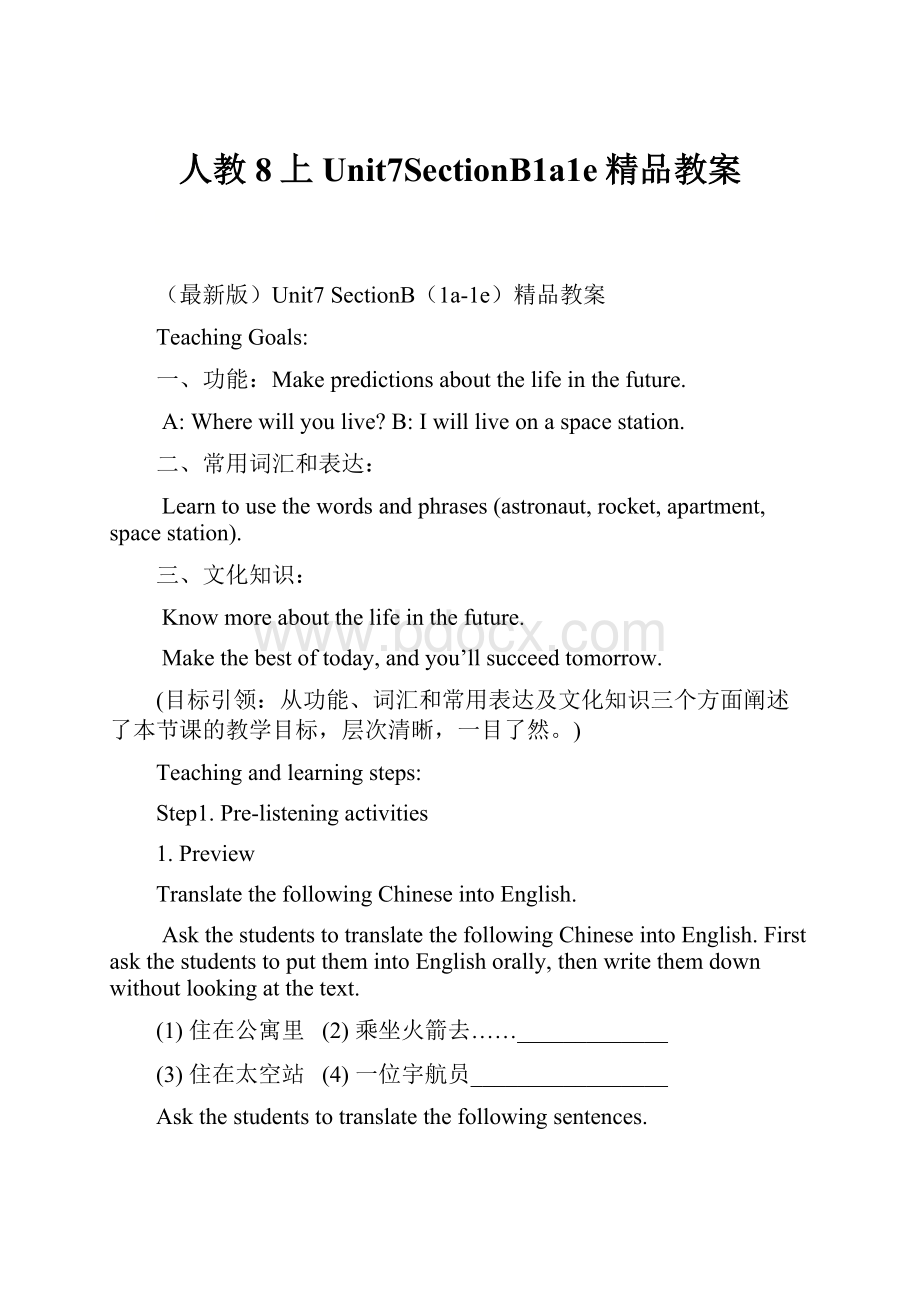人教8上Unit7SectionB1a1e精品教案.docx
《人教8上Unit7SectionB1a1e精品教案.docx》由会员分享,可在线阅读,更多相关《人教8上Unit7SectionB1a1e精品教案.docx(12页珍藏版)》请在冰豆网上搜索。

人教8上Unit7SectionB1a1e精品教案
(最新版)Unit7SectionB(1a-1e)精品教案
TeachingGoals:
一、功能:
Makepredictionsaboutthelifeinthefuture.
A:
Wherewillyoulive?
B:
Iwillliveonaspacestation.
二、常用词汇和表达:
Learntousethewordsandphrases(astronaut,rocket,apartment,spacestation).
三、文化知识:
Knowmoreaboutthelifeinthefuture.
Makethebestoftoday,andyou’llsucceedtomorrow.
(目标引领:
从功能、词汇和常用表达及文化知识三个方面阐述了本节课的教学目标,层次清晰,一目了然。
)
Teachingandlearningsteps:
Step1.Pre-listeningactivities
1.Preview
TranslatethefollowingChineseintoEnglish.
AskthestudentstotranslatethefollowingChineseintoEnglish.FirstaskthestudentstoputthemintoEnglishorally,thenwritethemdownwithoutlookingatthetext.
(1)住在公寓里
(2)乘坐火箭去……_____________
(3)住在太空站(4)一位宇航员_________________
Askthestudentstotranslatethefollowingsentences.
(1)我将会乘坐火箭去月球。
______________________________________
(2)我将会住在太空站里。
________________________________________
(【设计意图】:
本节课是一节听说课,课前对文本中的重点短语和句型有所了解,能够帮助学生更好的完成听力、对话练习,课上有针对性的听讲,更能培养学生的自主学习能力,还可以根据检测结果,以学定教。
)
2.Warmingupandlead-in.
T:
Boysandgirls,whichyearisitnow?
Doyouknow?
Ss:
It’s2013.
T:
What’syourjobnow?
Ss:
Iamastudent.
T:
Yes,YouliveinYichengandstudyinOrientalInternationalSchool,right?
Ss:
Yes.
T:
Great!
Doyouwanttohaveapredictionaboutthefuture?
Ss:
Yes.
T:
Now,let’shaveaprediction.(Pointtoonestudent)
You,please.Whatwillyoubeinthefuture?
S1:
Iwillbea/an…S2:
Iwillbea/an…S3:
Iwillbea/an…
S4:
Iwillbeanastronaut.
T:
Youwillbeanastronautinthefuture.Wherewillyoulive?
S4:
Iwillliveinanapartment.
S5:
Iwilllivein/on…S6:
Iwilllivein/on…S7:
Iwillliveonaspacestation.
T:
You’llliveonaspacestation,howwillyougotowork?
S7:
Iwillgotoworkbyrocket.
S8:
Iwillgotoworkby…S9:
Iwillgotoworkby…S10:
Iwillgotoworkby…
T:
Boysandgirls,justnow,wetalkedaboutourlifeinthefuture.Pleaselookatthe3pictures.ThisisAlexis,thisisJoe.Thefirstpicture,whosephotoisit?
Ss:
Maybeit’sJoe’spicture.
T:
Thesecondone,AlexisandJoearelyingonthegrass,whoisthemanflyinginarocket?
Pleaseguess.
Ss:
HeisJoe.
T:
Thethirdone,wherearetheynow?
Ss:
Maybetheyareinaparty.
T:
Areyouanswersallright?
Pleaselistentotherecordingandgetthemainideaoftheconversations.
(【设计意图】:
通过谈论学生现在的职业、居住地,过渡到谈论学生的未来,通过“接龙游戏”操练句型Iwillbea/an…/Iwilllivein/on…/Iwillgotoworkby…和表示职业、居住地以及交通方式的单词。
即在句型中操练相关单词,比直接让学生写单词效果好。
在听听力之前,引导学生观察课本中的三幅图,让学生对听力内容有所预测,然后通过听听力,判断自己的预测是否正确。
)
Step2.While-listeningactivities.
ListeningPracticeI
1.Listenforthegeneralidea听取大意
Themainideaoftheconversationsistotalkabout______.
A.theirjobsB.theirlivingplaces
C.theirlifeatpresent,inthepastandthefuture
(【设计意图】:
让学生通过听录音整体感知,并找出谈论的主旨大意。
听听力之前要对学生进行相关听力策略(在听听力之前先仔细审题,找出需要听的关键词,即用下划线标注的词)的指导。
这样能提高学生整体理解听力内容的能力,并能提高学生的听力效能。
)
2.Listenforthespecificideas听取细节
Task1.Listenandnumberthepictures(1-3).
T:
Fromtheconversationsweknowtheyaretalkingabouttheirlifeatpresent,inthepast,andthefuture,canyounumberthepictures1to3?
Ss:
Yes,2,3,1.
(【设计意图】:
听听力之前,让学生对三幅图进行了预测,并且通过听大意了解到这三段对话是描述的现在、过去和将来的生活,因此给三幅图排序,在听完大意之后,学生能够直接说出,比较简单。
)
Task2.Listenandfillintheblankswiththecorrectverbs.(见课本52页1d)
T:
Great!
Youaresoclever!
Next,let’slistentotherecordingagainandfillintheblankswiththecorrectverbs.Canyoufindsomerulesofthe8verbs?
Forexample,“am,like,work”theyareSimplePresentTense,theyareusedtodescribethethingsatpresent.Canyoufindoutthewordsthatareusedtodescribethethingsinthepast?
Ss:
Yes.“livedandtook”.
T:
Great!
Canyoufindoutthewordsthatareusedtodescribethethingsinthefuture?
Ss:
Yes.“willbe,willliveandwillfly”.
T:
Welldown,nowlet’slookatthesentencesof1donP52.Wecanseethefirstanswerhasbeengiven.“liveinanapartment”isaphrase.Canyouguessmorephrasesintheothersentences?
T:
Great!
Nowpleaselistentotherecordingcarefullyandfillinthechartwiththecorrectverbs.Ifyouwanttogettheanswersquicklyandcorrectly,pleasepaymoreattentiontothewordsinblue.
(Afterafewminutes.)
T:
Haveyoufinished?
Ss:
Yes.
T:
Igetsomestudentstoshowyouranswers.(Ask3studentstoshowtheiranswers.)
(【设计意图】:
做1d之前,先引导学生观察给出的8个动词的特点,然后对学生进行听力策略指导:
即猜测8个句子中有可能出现的短语,比如:
takethetrain,由此可以判定第5题,只能填took,根据短语flyrocketsto,liveonaspacestation可知第7题填willfly,第8题填willlive.另外,认真观察的学生会发现:
前三个动词对应的是前三个句子,中间两个动词对应的是第5、6句,最后一般将来时的动词对应的是第6、7、8句,这样很容易就把答案写出来。
)
Task3.Listenandfillinthechart.
T:
Welldone!
Pleaselistentotherecordingagainandfillinthechart.First,let’slistentoConversation1andfillintheblanksof“Thelifeatpresent”.
Conversation1:
ThelifeatPresent
Placestolive
Placestowork
Job
1.Ilivein_____________
acrossthestreetfrom
Highville.
Iworknear
here,too.
2.Iamacomputer
___________.
T:
Next,let’slistentoConversation2andfillintheblanksof“Thelife10yearsago”.
Conversation2:
Thelife10yearsago
Placestolive
Placestostudy
Transportation
3.Ilivedina______withmyparentsinGreenville.
4.Iwentto______here
inHighville,though.
5.Itookthe
_____toschool.
T:
Next,let’slistentoConversation2andfillintheblanksof“Thelife10yearsago”.
Conversation3:
Thelifein10years
Job
Transportation
Placestolive
5.Iwillbean
___________.
6.Iwillfly________tothemoon.MaybeI’llalsofly
tootherplanets.
7.Iwillliveona
____________.
T:
Doyouthinkitiseasyordifficultforyou?
Ss:
…
(【设计意图】:
设计表格让学生填空,一是为了进一步巩固听力中所出现的表示职业、居住地和交通方式的词;另外也是为了输出环节的复述听力内容做铺垫。
)
Step3.Post-listeningactivities.
T:
Next,let’slistentotherecordingagainandrepeatafterit,paymoreattentiontoyourpronunciationandintonation.
Task1.Listenandrepeat.
Alexis:
Joe,whatdoyouthinkyourlifewillbelikein10years?
Joe:
IthinkI’llbeanastronaut.I’llflyrocketstothemoon.MaybeI’llalsoflytootherplanets.
Alexis:
Wherewillyoulive?
Joe:
I’llliveonaspacestation.
(【设计意图】:
语音学习的主要方法是模仿,模仿在正音、训练学生语句重音的同时,还能培养学生的语音、语调以及对句子重音的把握。
)
Task2.Retell.
T:
Justnow,welistenedtotheconversationsaboutJoe’slifeatpresent,inthepastandthefuture.Next,let’sretellhisstory.Thereare2choiceshere.Choice1iseasy,Choice2isalittledifficult.IfyouchooseChoice1andretellitfluently,youcangetonemark.IfyouchooseChoice2,youcanget2marks.Iwillgiveyouanexampleabout“Thelifein10years”:
Joewillbeacomputerprogrammer.Itiskindofboring.Hedoesthesamethingseveryday.
选做一:
选做二:
(【设计意图】:
此环节设计了两种形式,选做二()的思维树,适合优等生,让他们根据关键词来复述,训练他们的思维能力和语言表达能力。
选做一()的表格适合于中下等生,他们很难根据关键词来复述听力内容,而且很难正确使用动词的适当形式,但即便他们能根据表格中的短语把听力内容表述出来也是一种胜利!
)
Task3.Predictyourfuture.
T:
Boysandgirls,justnowwetalkedaboutJoe’slifeatpresent,inthepastandthefuture.Wouldyouliketopredictyourfuture?
Ss:
Yes.
T:
Atfirst,I’llshowyoumyfuture.
T:
Boysandgirls,pleaseworkinpairsandshowyourfuturetoyourpartner.Onesentence,onepoint.Twosentences,twopoints.Themore,thebetter.
(【设计意图】:
通过设计一个真实、贴近学生生活的情景,激发学生的学习积极性,让学生运用所学内容,来完成一个生活中的真实的任务。
从而,达到了培养学生综合运用英语的能力,是知识转化为能力进而提高能力的重要环节。
此环节老师先介绍自己的未来生活,学生比较感兴趣,给出学生语言支架,让他们利用这个支架来描述自己的将来的生活,多数学生能够正确表达自己的想法,并能正确运用一般将来时态。
)
Step4.Inquiryintoknowledgebytranslation.
1.Iliveinanapartmentacrossthestreetfromherenow.
本句谈论的是的居住地,因此用了时态。
2.Welivedinahouseinthecountrytenyearsago.
本句谈论的是的居住地,因此用了时态。
3.I’llliveonaspacestationintenyears.
本句谈论的是的居住地,因此用了时态。
(【设计意图】:
鼓励学生通过合作学习自己总结,引导学生观察、发现、归纳和掌握语言规律,形成有效的学习策略,必要时老师可以给予适当的点拨,落实了以学定教。
)
Step5.Summary.
T:
Great!
Allofyoudidaverygoodjob.Iamsohappytoday.Class,pleasethinkoverwhatyou’velearntthisclass?
(Askstudentstosaythekeywords,phrasesandsentences.)
T:
Great!
Canyoutellmethedateoftoday?
Ss:
It’sNovember21st,2013.
T:
Yes.Wecallitpresent.Whatwasthedateyesterday?
Ss:
It’sNovember20th,2013.
T:
Wecallitthepast.Whatwillthedatebetomorrow?
Ss:
November22nd,2013.
T:
Yes.Wecallitthefuture.Whenwetalkedaboutsth.inthefuture,weshoulduse…?
Ss:
Will+动词原形。
T:
Great!
T:
Boysandgirls,ifwestudyhardtoday,whatwillhappentoyou?
S1:
I’llgetgoodgrades.
S2:
I’ll…
T:
Ipredicteveryoneofyouwillhaveabrightfuture!
Makethebestoftoday,andyou’llsucceedtomorrow!
(【设计意图】:
学生总结本节课所学内容,对本课所学重要内容进一步深强化巩固。
同时培养学生的归纳总结能力,养成自主学习的习惯。
在对学生进行知识教育的同时,也注重对学生的文化知识教育和情感教育。
)
Step6.Theend-of-classtest当堂检测
(【设计意图】:
当堂检测题是针对本节课所学内容进行的形成性评价,这样既能使学生巩固本节课所学知识,又能让老师了解到学生本堂课真实的学习情况,并对错误较多的知识点进行巩固强化。
此环节设计了四种题型,从不同的角度考查学生的掌握情况。
在学生做题时,给予一定的策略指导,如用所给词的适当形式填空,提醒学生注意其中的关键词,做翻译句子题,提醒学生先掌握里面的一些词组,然后再试着翻译整个句子,这样有利于提高学生做题的准确率。
)
Step7.Homework.
Youmust:
1.Masterthekeywords,phrasesandsentences.
2.Finish1aand1b.
3.Preview2a~2e.
Ifyoucan:
Writeanarticleaboutyourlifeinthefuture.
(【设计意图】:
分层布置作业,第一层作业帮助学生巩固本课所学基础知识和目标语言;第二层作业在此基础上,把所学知识运用到实际生活中,提高学生综合运用语言的能力,学以致用。
)
优点:
1.在操练表示职业、居住地和交通方式的单词时,放在具体的语境中,采用“接龙游戏”的方式,学生乐于接受,调动了课堂气氛。
2.听力练习比较充分,注重了对学生听力策略的指导,消除学生对听力的“恐惧”心理,让学生能够高效做题。
3.在语言输出环节,设计任务时,兼顾优等生和中下等生,对他们提出了不同程度的要求:
中下等生能够顺利完成所设计的任务,优等生在完成基本任务的基础上,发散思维,语言表达能力有了进一步的提升。
4.翻译探究环节,让学生先自主探究本节课的难点。
自己思索之后,先写出答案,然后再以小组为单位解决自己的疑难问题,本节课内容比较简单,多数学生能够顺利写出答案。
5.每个环节之间都有过渡语,并且注意语言的抑扬顿挫,充分调动学生积极性。
同时注重对学生的鼓励性的评价:
“Great!
Welldone!
Excellent!
...”
6.在课堂上关注每一个学生,尤其是学困生,尽可能的让每个学生都能听懂、学会、会学。
不足:
学生的预习检测环节做的不太好,因此在此部分留给学生的时间有些长,影响了后面的活动,最终当堂检测题没做完就下课了。
由此说明,自己还是没有充分地“备好学生”,课前的预设工作做得不到位,路漫漫其修远兮,吾将上下而求索。
将反思和努力进行到底!
使用建议:
1.第六单元学了很多关于职业的名词,本节课也涉及到了职业名词,因此,课前给学生分组时,可以采用职业名词进行分